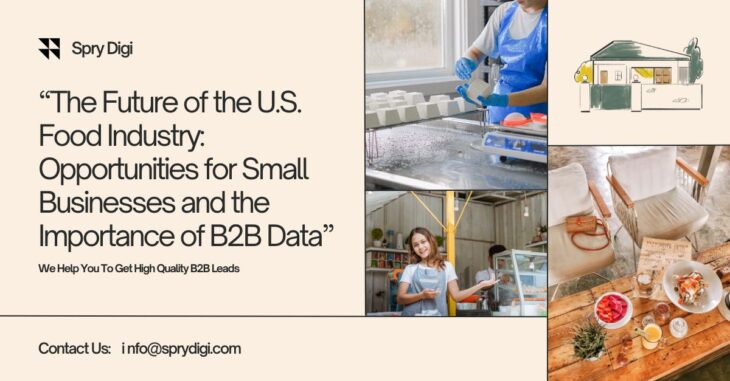The Future of the U.S. Food Industry: Opportunities for Small Businesses and the Importance of B2B Data
The U.S. food industry is a massive and dynamic market, projected to reach over $1.1 trillion by 2024, driven by consumer demand for convenience, sustainability, and health-conscious products. For small food business owners, understanding current trends and leveraging the right B2B data can position them for growth and success.
Advantages of the U.S. Food Industry:
- Rising Consumer Demand: Health-conscious consumers are fueling growth in sectors such as organic, plant-based, and functional foods. The trend towards “better-for-you” products is a huge advantage for businesses offering niche and innovative food solutions.
- Sustainability and Eco-Friendly Products: With consumers focusing on environmental impacts, there’s a growing demand for locally sourced, eco-friendly packaging and sustainable food products.
- Technology and E-Commerce Expansion: The surge in online food sales—expected to reach $200 billion by 2026—gives small businesses access to a nationwide market without the need for large distribution networks.
- Snacking Culture and Convenience Foods: U.S. consumers increasingly opt for convenience, creating opportunities for businesses to offer quick, nutritious, and ready-to-eat food items.
Future Revenue Potential:
- The U.S. food industry is on track to grow at a steady pace, with sectors like plant-based foods growing at 12% annually.
- By 2030, the U.S. food and beverage industry is expected to exceed $1.5 trillion in revenue.
- Organic food sales alone crossed $60 billion in 2023, showing strong consumer preference for healthier options.
Importance of B2B Data for Small Food Business Owners:
For small business owners, expanding reach, forming partnerships, and entering new markets require more than just a quality product—it demands precise targeting, which can be achieved using B2B data.
- Company Profiles: Having access to detailed company profiles helps identify the right distributors, suppliers, and retailers who are most aligned with your business goals.
- Emails: Targeted email marketing campaigns can build relationships with decision-makers, helping you generate qualified leads.
- Phone Numbers: Direct contact via phone allows for quicker responses, enabling real-time discussions about potential partnerships or sales deals.
Where to Get B2B Data:
- B2B Data Providers: Companies like ZoomInfo and Spry Digi offer verified and customized B2B data that includes company profiles, contact emails, and phone numbers, specifically tailored to the food industry.
- Industry Events and Networking: Attending food expos, joining industry-specific organizations, or connecting through LinkedIn can help you gather valuable B2B contacts.
- Spry Digi: A reliable provider of customized B2B data solutions, Spry Digi, specializes in helping small businesses connect with key decision-makers to grow their business.
By investing in accurate and reliable B2B data, small food business owners can build strategic partnerships, expand their market presence, and capitalize on the rapidly growing U.S. food industry.
